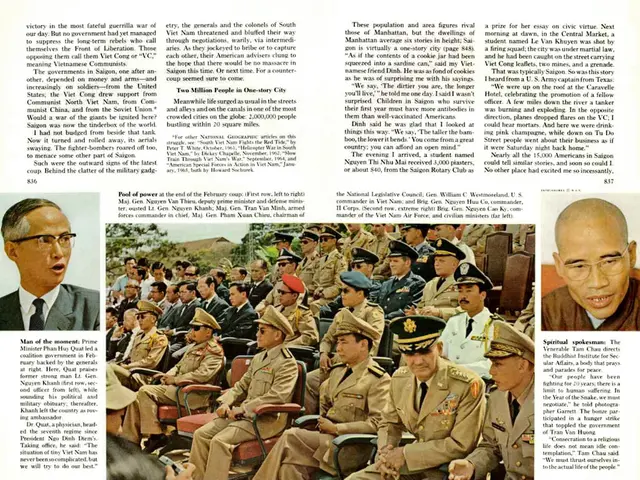Interviewers Assess More Than Professional Skills
Seeking Job Prospects: Top 11 Responses for Your Upcoming Position Inquiry
During each job interview, hiring managers not only evaluate a candidate's professional skills but also seek insights into their career goals. This isn't simply a cursory consideration; it holds significant implications for the organization.
If a candidate's objectives do not align with the company's direction, the assumption is that they may not be the best fit for the role or may be likely to depart soon. Thus, it's crucial to carefully consider one's response when asked about desired future employment opportunities.
Practical Guidance for Answering Interview Questions
Research is Key
Before the interview, it's advisable to conduct thorough research on the company's mission, core values, and culture. This information can help align your career aspirations with the company's ethos, demonstrating that you share the same values.
Additionally, exploring the company's current position in the market and its unique offerings can provide valuable talking points that underscore your interest in being part of its success.
Express Enthusiasm
Genuine enthusiasm for future opportunities with the company can set you apart from other candidates. Use positive, upbeat language, express a confident tone of voice, and show excitement through non-verbal cues like gestures, posture, and eye contact.
Avoid a monotone delivery or crossed arms, as these can convey an unengaged attitude. A smile and genuine enthusiasm can put interviewers at ease and leave a positive impression.
Mention Learning Opportunities
Employers value candidates who are eager to learn and grow within their roles. Share past experiences that underscore your initiative in acquiring new skills and highlight any specific skills or certifications you aspire to obtain.
Aligning your learning goals with the job requirements demonstrates that your desire to grow professionally directly benefits the company.
Examples of Desirable Responses to Interview Questions
Here are 11 example responses for when interviewers ask what you are seeking in your next position:
- Professional Growth Opportunities:
"I am thrilled by the chance to expand my skill set beyond the job description, such as through cross-functional projects or advanced training programs. That's why I'm currently seeking a position that both acknowledges the importance of continuous learning and actively promotes it. It would be even better if there is a clear career path for the role."
- Challenging Projects:
"I am seeking a role that offers a dynamic, stimulating team environment where I can contribute my expertise to tackle challenging projects. For me, pushing my boundaries for creative solutions is one of the best ways to promote personal and professional growth. It also encourages a positive, innovative workplace culture, which perfectly resonates with my career aspirations."
[...]
By carefully crafting your responses, you can demonstrate to hiring managers that your goals and aspirations align with their company's direction, increasing your chances of being selected for the role.
Respected Sources
[1] Moores, F. (March 27, 2023). How to discuss your career goals in a job interview. Forbes. https://www.forbes.com/careers/life-learning/how-to-discuss-your-career-goals-in-a-job-interview/
[2] Johnson, M. (September 15, 2021). How to Answer "What Are Your Career Goals?" in an Interview. Monster. https://www.monster.com/career-advice/article/how-to-answer-what-are-your-career-goals-in-an-interview
[3] Mccammon, K. (August 1, 2022). Why Aligning Career Goals with a Company’s Direction Matter—and How to Do It Effectively. The Muse. https://www.themuse.com/advice/aligning-career-goals-with-company-direction
[4] Friedman, K. (March 29, 2023). How to Answer "What Are Your Career Goals?" Reliably—Every Time. The Balance Careers. https://www.thebalancecareers.com/how-to-answer-what-are-your-career-goals-3976783
[5] McMillan, C. (June 29, 2021). How to Align Your Career Goals with a Company and Land Your Dream Job. The Toggl Blog. https://toggl.com/blog/align-career-goals-with-company-land-job
- During job interviews, it's essential to demonstrate a desire for career development that aligns with the company's direction, as this can significantly impact the organization's future growth and success.
- Before an interview, research the company's mission, core values, culture, market position, and unique offerings to ensure your career aspirations resonate with the organization's ethos and show your interest in contributing to its success.
- Displaying enthusiasm for the role through positive, upbeat language, confident tone, and enthusiastic gestures can set you apart from other candidates, leaving a favorable impression on interviewers.
- Mentioning your aspirations for learning opportunities and professional growth, and tying them to the job requirements, demonstrates a commitment to personal development that benefits the company in the long run.
- When discussing career goals during an interview, it's recommended to focus on professional growth opportunities, challenging projects, and personal development, as these qualities can make you an appealing candidate to employers.
- Seeking guidance from respected sources like Forbes, Monster, The Muse, The Balance Careers, and Toggl Blog can provide practical advice on how to effectively articulate your career goals to potential employers during job interviews.








